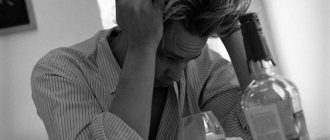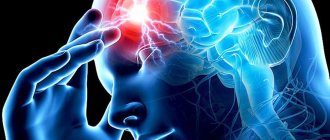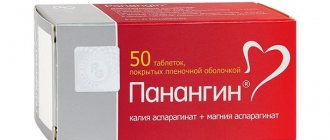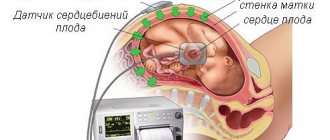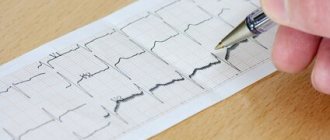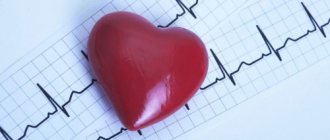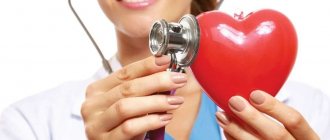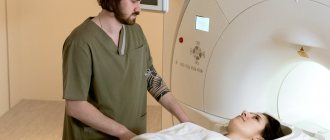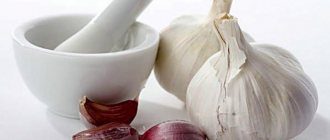Heart rate during sleep decreases by an average of 7-8% in adults and 8-9% in children compared to daytime values (at rest). The lowest heart rate occurs around 4 a.m., and the pulse accelerates before waking up. To measure, you need the help of a loved one; he counts the pulsation on the wrist, but this method is very inaccurate.
A fitness bracelet can also help determine your nighttime heart rate; some models have a data saving function. To diagnose heart disease, it is necessary to register an ECG in the 24-hour monitoring mode; only with its help are rhythm disturbances and vascular diseases detected. By the indicator of heart rate variability (variability) at night, you can predict the risk of stroke, heart attack, and heart failure.
Why can your heart rate change during sleep?
The pulse changes during sleep in completely healthy people because:
- lack of physical activity;
- metabolism slows down;
- body temperature decreases;
- the brain sends signals to the heart in a basic mode, that is, only to maintain the function of internal organs at rest;
- At night, the tone of the parasympathetic nervous system (vagal nerve) increases, while in the daytime sympathetic impulses predominate.
Heart rate can be affected by:
- late meals;
- drinking alcoholic beverages, coffee, smoking shortly before bedtime;
- low or excessively high room temperature;
- poor ventilation;
- heavy dreams;
- pain;
- sleep apnea syndrome (stopping breathing), snoring;
- infectious diseases;
- disruption of the heart, kidneys, liver;
- neurosis;
- cardiopsychoneurosis;
- hormonal imbalance due to changes in the function of the thyroid gland, adrenal glands, hypothalamus and pituitary gland of the brain;
- pregnancy;
- menopause;
- use of medications;
- watching movies before bed;
- conflict situations.
We recommend reading the article about what your heart rate should be to burn fat. From it you will learn at what heart rate fat is burned in men and women, calculation formulas, and ways to evaluate the result.
And here is more information about how to measure your pulse.
Symptoms
Since nocturnal attacks of tachycardia are accompanied by a panic attack, after sleep a person can explain them as disturbing dreams and not attach any significance.
This approach to assessing health status is justified only when attacks are isolated. If night palpitations constantly cause sleep disturbances, after waking up the rhythm does not normalize, shortness of breath appears, and subjectively tachycardia is felt as an attempt by the heart to jump out of the chest, then a trip to the doctor cannot be postponed.
Characteristic signs that tachycardia during sleep is serious and it is necessary to sound the alarm are pain and a feeling of tightness in the chest, dizziness, and fainting.
Pulse during sleep: the norm in a healthy person
Normally, in a healthy person, the pulse slows down slightly during sleep; there are differences in adults and children (see table).
| Age | Normal heart rate during the day (average) beats/minute | Normal heart rate during sleep beats/minute |
| Up to 3 months | 125 | 113 |
| 3-5 months | 105 | 97 |
| 6-12 months | 100 | 91 |
| 1-10 years | 95 | 86 |
| 10-12 years | 100 | 92 |
| 13-17 years old | 85 | 78 |
| 18-50 | 70 | 64 |
| 51-80 | 79 | 73 |
These indicators are average; small deviations (10-15 beats) in both directions are not considered a sign of disease.
It is important to understand that even repeated measurements of the pulse day and night do not provide the doctor with the necessary information without examining, listening to the heart and ECG. If necessary, a more extensive examination is required.
In adults
Normally, the pulse during sleep in women does not exceed 70 beats per minute and does not fall below 40. For men, 45-75 shock waves in 60 seconds are considered an acceptable interval. The lowest readings occur around 4 a.m. and during the deep sleep phase, and against the background of dreams, heart rate increases slightly.
Heart rate curve during sleep
Heartbeat in children
Children's heartbeats are more frequent both during the day and at night. It is subject to quite pronounced fluctuations normally, that is, the difference between the maximum and minimum heart rate is higher than in adults.
The indicators are affected by age (in a newborn, the heart contracts more often) and body temperature. For a healthy child, nocturnal sinus arrhythmia (irrhythmic pulse) is considered a physiological (natural) condition with strong emotions during the day, fatigue and hot weather.
Medicines
In many home medicine cabinets you can find drugs to reduce heart rate. They are available without a doctor's prescription and will help you quickly restore your performance. However, before taking them, it is important to find out the cause of this symptom, since different groups of drugs have different compositions and are indicated for tachycardia of different origins. So, the doctor may recommend the following medications:
- Valocordin, Corvalol - drugs based on phenobarbital and plant extracts, available in the form of drops that need to be diluted in water;
- valerian officinalis - comes in the form of drops and tablets, it helps well with tachycardia caused by nervous tension;
- rosehip or hawthorn fruits, motherwort root - raw materials for the preparation of soothing decoctions, useful for calming the heartbeat;
- if necessary, medications to replenish potassium or magnesium deficiency (Asparkam, Panangin).
There are contraindications, you need to consult a specialist!
Related posts:
- Left side hurts Pain is a complex process, the occurrence of which is not fully understood. She…
- Not enough oxygen - why and what can help Hypoxia (literal translation from Greek - “little oxygen”) is a condition...
- My head is spinning, how to deal with the problem of VSD When the world “floats”, it becomes uncomfortable and frightening: you have to not...
- Neuralgia: causes, symptoms Neuralgia is damage to the peripheral nerves, accompanied by intense pain in…
How to measure your pulse correctly at night
To correctly measure your pulse at night without instruments, you can ask a loved one to count the number of beats per minute on the radial artery (wrist near the base of the thumb). This method is very inaccurate, since during sleep the reaction to external stimuli remains, so even without awakening the rhythm accelerates. The place for determining the heart rate can be the radial artery, the carotid artery in the neck, the temporal or ulnar artery.
The second indicative method is a fitness bracelet . To find out how many beats per minute your heart makes during sleep, just put it on your hand before going to bed and record the readings on the screen with a loved one. There are also models that can independently save measurements in memory at a specified interval. However, such independent measurements do not provide the doctor with the necessary information about the functioning of the heart.
The only reliable option is to record an ECG throughout the day . Only in this case it is possible not only to very accurately calculate the pulse based on the intervals between ventricular complexes, but also to identify hidden arrhythmia. Based on daily monitoring, another important indicator is calculated - it is called heart rate variability.
It has been established that in a healthy young person, the heart rate changes to a greater extent during the day and at night than in the elderly and with heart disease. For example, at rest during the day the pulse is 68 beats per minute, and at night it varies from 58 to 65. This means a good degree of adaptation to changes in the external and internal environment. A narrow range of fluctuations is a sign of vascular diseases.
Diagnostic methods
The main methods for diagnosing nocturnal tachycardia are:
ECG
The main method for detecting nocturnal tachycardia is to take an ECG. Performed when you first seek medical help.
An ECG helps to study the work of the myocardium during the day and exclude the presence of daytime heart rhythm disturbances
Holter cardiogram
To document the fact of nocturnal tachycardia when a person goes to bed gives a chance to take a Holter electrocardiogram. The mobile device is attached to the patient for a day. A Holter ECG will not only detect nocturnal palpitations, but will also make it possible to determine its type and severity.
Echocardiogram
Another name is ultrasound of the heart. Allows you to “see” on the screen all the structures of the heart: chambers, valve apparatus, vessels. The functioning of the endocrine glands is checked using blood biochemistry, ultrasound of the thyroid gland, and pancreas.
What should your heart rate be before bed?
Your heart rate before bed should be between 60-90 beats per minute. The same indicators are the norm for a state of rest during the daytime. To avoid the influence of changes in body position, you must first lie quietly for 5-7 minutes, and only then measure your pulse rate. Before going to bed, it is more convenient to use a stopwatch with a sound signal when taking measurements.
When waking up after sleep
Before waking up after a night's sleep, the pulse rate increases, as the inhibitory effect of the cerebral cortex weakens and the work of the adrenal glands is activated. With vegetative-vascular dystonia, patients may experience rapid heartbeat in the morning. This is not dangerous; to restore normal rhythm, you need to lie down for 5-7 minutes after sleep and avoid sudden changes in body position.
Attacks of palpitations
If a person experiences attacks of rapid and strong heartbeat, then he should fix his attention on the following manifestations of tachycardia:
- the frequency of occurrence of such a condition;
- duration of the attack;
- the cause of tachycardia (stress, food, physical activity, no apparent reason);
- typical time of onset of attacks (time of day);
- associated symptoms;
- pulse rate and rhythm;
blood pressure readings during an attack.
Why does low heart rate appear during sleep?
Low heart rate during sleep occurs when:
- neuroses;
- neurocirculatory dystonia;
Symptoms of neurocirculatory dystonia
- compression of the neck (for example, a tight golf collar);
- pressing on the eyeballs with a sleep mask;
- consequences of neuroinfection (meningitis, meningoencephalitis), skull trauma, hemorrhage;
- diseases of the digestive system - peptic ulcer, cholecystitis, pancreatitis, hepatitis;
- low thyroid function;
- myocardial damage - inflammation (myocarditis), dystrophy (weakness), previous heart attack;
- taking medications to lower blood pressure, treat arrhythmia;
- severe infection.
It is typical that with these pathologies the pulse is below 60 beats per minute during the day. A slow heart rate without disease is possible in professional athletes and the elderly.
What is the minimum
The decrease in heart rate can be to a minimum during sleep - 36-40 beats per minute. In this case, not only the degree of decrease in pulse is important, but also the presence of symptoms of circulatory disorders - difficulty breathing, an attack of chest pain, darkening in the eyes after waking up. It is not always possible to detect a rare pulsation of blood vessels with heart disease, so any unpleasant sensations require an examination by a cardiologist and a comprehensive examination.
What to do if heart rate is 40
If the heart rate (HR) is 40 beats per minute at night, and during the day it rises to normal levels (60 and above) or is about 50, but there are no symptoms, then it is enough:
- review the prescription of medications (carried out only by the attending physician);
- normalize work and rest schedules;
- provide constant access to fresh air during sleep;
- go for a walk in the evening (from half an hour).
If a patient’s low pulse causes any discomfort—headache, dizziness, lightheadedness, or fainting—then it is necessary to immediately undergo examination by a cardiologist. Based on its results, treatment with drugs (for example, Teopek) is prescribed or the issue of installing a pacemaker is considered.
Causes of tachycardia
During sleep, the entire body restores its functioning. He is in a relaxed state and gaining strength. Tachycardia at night is a dangerous syndrome in which the heart works at an increased rate with incomplete filling of the ventricles with blood. An attack of tachycardia at night can be either temporary or repeated at intervals. The reasons why your heart rate increases at night can be of different nature. Tachycardia is a symptom of the disease, not a deviation. Arises as a result:
- suffered severe stressful situations;
- problems with the heart and blood vessels;
- obesity;
- pathologies of the endocrine system;
- problems with the thyroid gland;
- gastrointestinal deviations;
- malfunction of the central nervous system;
- presence of asthma;
- rheumatism;
- hypoxia;
- pneumothorax;
- pulmonary obstruction;
- thyrotoxicosis;
- allergies.
Why does the pulse rise in a dream?
During sleep, the heart rate rises due to:
- using drugs that reduce the activity of the vagus nerve (for example, for abdominal pain or to relieve an asthma attack);
- instillation of vasoconstrictor drops into the nose;
- smoking;
- drinking alcoholic beverages, coffee, strong tea;
- a hearty dinner before bed, especially with spicy dishes;
- physical or emotional stress, intense mental work;
- nightmares;
- sleep apnea syndrome;
- decreased blood flow to the brain (usually due to osteochondrosis);
- vegetative reactions against the background of menopause, pregnancy;
- infectious diseases;
- heart diseases – angina pectoris, heart failure, myocarditis;
- increased function of the thyroid gland and adrenal glands.
For the vast majority, a rapid pulse at night is combined with tachycardia (heart rate of 90 beats/minute) during the day. To slow down the rhythm, it is recommended to drink a glass of cool water, lightly massage the eyeballs through the eyelids and press on them, counting to 10.
If the readings are high only at night
High rates only at night can occur in patients with attacks of sleep apnea. Due to the blocking of the airways by the enlarged soft palate, oxygen ceases to flow into the body, which is perceived as stress. Therefore, the heart rate accelerates. For treatment, you must contact an ENT doctor.
Pregnant women experience a rapid pulse in late pregnancy when lying on their back. The reason for this is compression of the inferior vena cava by the enlarged uterus and restriction of blood flow to the heart. You can avoid rhythm disturbances by sleeping on your side.
What is nocturnal tachycardia
Nocturnal tachycardia is an increase in heart rate of more than 90 beats per minute during sleep. If it occurs due to insomnia or excessive consumption of coffee in the evening, then it is a variant of the norm.
If tachycardia bothers you regularly without obvious provoking factors, then this may be a symptom of some pathological processes in the body.
Preventing heart rate changes
In order to prevent changes in heart rate not associated with diseases, it is recommended:
- reduce stress during the day;
- dedicate at least half an hour every day to moderate physical activity;
- before going to bed, do relaxing breathing exercises an hour before bed (exhalation is longer than inhalation), a slow walk, a warm bath or shower are useful;
- Dinner should be served 4 hours before bedtime, it should not contain fatty and spicy foods, drinks with caffeine, 45-60 minutes before you can drink 2/3 cup of kefir or yogurt, eat 50 g of low-fat cottage cheese;
- two hours before a night's rest, stop watching movies and using electronic gadgets;
- stop smoking and drinking alcohol in the evening.
For patients with pain in the heart area or attacks of palpitations, interruptions of these measures are not enough; they need to take medications to prevent heart rhythm disturbances.
We recommend reading the article about why there is pulsating in the ear. From it you will learn about the causes of pulsating tinnitus, as well as methods for diagnosing and treating pulsating tinnitus.
And here is more information about what provokes a low pulse with high blood pressure.
During sleep, your heart rate slows down by 7-9% compared to daytime levels. It can be measured by counting beats on the radial artery with outside help or using a fitness bracelet, but to detect rhythm disturbances you need an ECG in 24-hour monitoring mode.
Other causes of nighttime palpitations
Strong heart palpitations at night are caused by the following reasons:
- Organic myocardial lesions (cardiomyopathy), diseases of the endocrine system (thyrotoxicosis, diabetes mellitus). The patient is aware of the diseases, and treatment is aimed at combating the underlying pathology.
- Intoxication with alcohol, nicotine, acute infections, uncontrolled use of cardiac medications (self-medication).
- Anemia.
Sometimes the doctor cannot reliably determine the cause of nocturnal tachycardia. Such cases are considered idiopathic.

